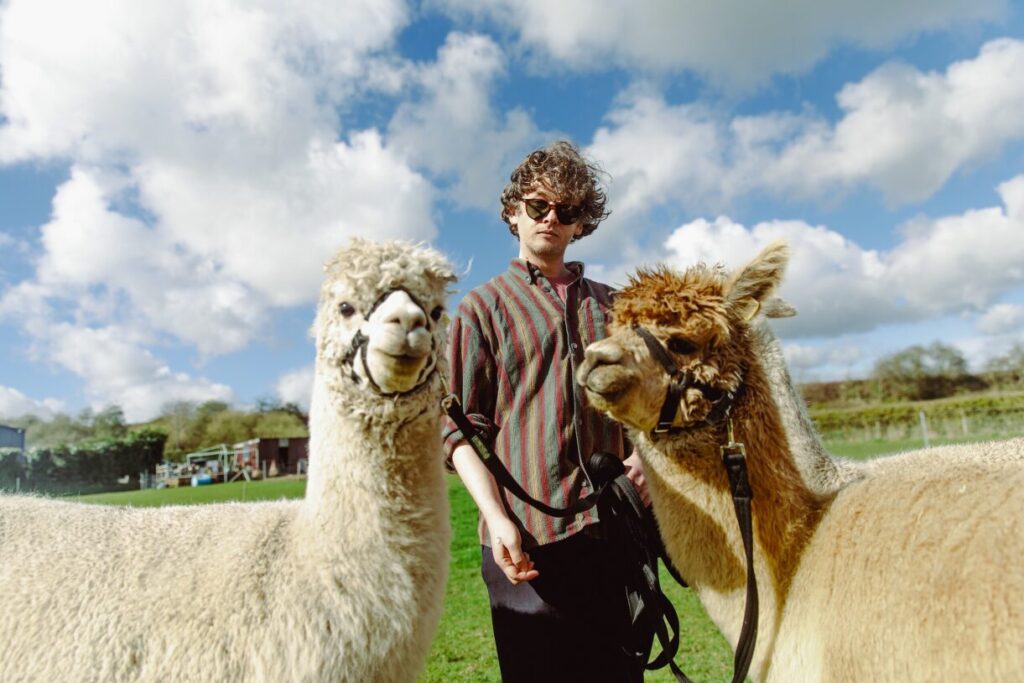As our zoom meeting starts, Bill Ryder-Jones is texting his manager to pick up what sound like very delicious sandwiches, from the nearby deli. He’s out of cigarettes as well, he remembers, deftly tapping the request into his phone. He’ll be tucking into both after we talk, a post-interview pick me up perhaps. ‘So be as tough as you want, Cath,’ he jokes before we start proper.
GIITV are not ones to shy away from a challenge, but giving the Wirral musician and composer a rough ride feels a bit much, on balance. He does a pretty thorough job of beating himself up as it is, albeit via the medium of songwriting.
Bill ushered us into 2024 with new record Iechyd Da (Good Health), and how thankful are we for this beautiful and relatable album. It wouldn’t be a Ryder-Jones release if he did not walk with a stone in his shoe and share that journey with his audience, but with Iechyd Da there feels a further shift, delivering personal truths with elegance, and the key element of hope he stresses throughout our conversation.
It’s stating the bleeding obvious to say his work is forever honest. Iechyd Da is no different on that score.
‘I have no time for vague imagery, to explain the way things look. I try and find interesting ways of telling people about things that have happened to me. My mind is always racing, and it focuses my mind in a positive way. Everyone’s doing it nowadays, everyone’s got mental health problems and writing honest songs. I’ve been doing it 20 years…’
You’re on trend, Bill.
‘It can go the other way too. I have to be careful around gigs because if my energy goes too much the other way, I can be quite unbearable. Not a bad person, but I can very much can enjoy the smell of my own farts,‘ he says. ‘I don’t really put that in songs. I try and show that side of myself by being honest in interviews. I’m not constantly desperately unhappy. I mean, there’s a low level of unhappiness and malaise generally in my life, the world’s fucking unbearable and people are shit but I also really love people. I do like making people laugh and comedy and you know, I mean, it’s important to show both sides.’
The new album’s title is both ironic – given how often he speaks of his health struggles – but offers manageable optimism. Iechyd Da is a record you want to spend a lot of time with. An emotional investment returning rich rewards. And it’s a work he spent a substantial amount of effort in creating. Having his own studio now, a handy mere minutes away from home, gifted the precious luxury of time.
‘The joy of having your own place, I can quite often be sat here, eight o’clock at night and go oh, I’ll go to the studio for a few hours. And that’s why the album is as good as it is,’ he explains, before adding ‘I was obsessed with it. It was my life.’
Bill is learning Welsh, the title of the album and instrumental closer ‘Nos Da’ (Good Night), are in the language. It’s worth mentioning at this point how he is often cited by new and emerging artists from the country. He seems pleased and surprised to hear this, and details his relationship with Wales and its culture starting as a youngster, holidaying with family.
‘The first thing to know is that Wales is outside of that window there.’ He’s sitting crossed-legged, acoustic guitar leaning against the sofa, but points past a stack of vinyl albums at the back of the room. When in The Coral as a teenager and in his early twenties everything was very Liverpool-focused, he reckons. They weren’t ‘cool enough’ to be scousers. Whatever cool means. Discovering Welsh heroes and inspirations Super Furry Animals (SFA) and Gorky’s Zygotic Mynci brought with it realisations. ‘It shaped an identity for the band as a whole. I think going from considering yourself, not cool because you’re from the Wirral that changed to actually no, we’re actually just somewhere between Wales and Liverpool. Gorky’s Zygotic Mynci will always be my favourite group, the group that brings me the most happiness aside from The Beatles. They are my band.’
They could be your mastermind subject, I suggest. Bill shakes his head in denial and defeat, naming Gruff Rhys drummer and SFA archivist Kliph Scurlock as the man to beat on the Gorky’s knowledge front. ‘Sadly, he does know more than me and he’s a cracking guy,’ he smiles. ‘For me, it starts with them. Euros Childs’ melody writing is second to none and it’s something that’s fed into this love of Wales that I had as a child. People look the same, cars are the same, shops look the same, but it has this language that looks the same but all in the wrong order. And for a kid like me, very imaginative, i spent a lot of time in my own head, it was like some kind of secret world, you know? It just felt I was just happy there. Like there’s something magical about the place.’
Bill has written a song in the Welsh language, with Stephen Black aka Sweet Baboo. It is by Bill’s own admission ‘lovely’ but we’re unlikely to hear it, not for a while anyway. He’s aware of the dangers of cultural appropriation. ‘I want to be very careful, sensitive about these things. I understand that I’m an Englishman, and there’s a fetish for Wales, right? I sound good singing in that language, I just felt like it would be a step too far right now. Maybe one day, but I’d want to be fluent,’ he says. ‘The only way I could do it now is if i made a joke of myself of not really been able to speak Welsh. And if the song was perhaps really poorly translated, it could be quite funny, quite cute. Yeah…maybe that’s an idea.’

Running with that theme of respect, he’s stressed a wish Iechyd Da be a safe space for his audience. He values the importance of such, naming the precious records bringing him safety when he heeds it. Bill winces when Gorky’s aren’t permitted on today’s list but names The Beach Boys’ opus Pet Sounds, Super Eight by Lee Perry / George Faith, Enter the Wu-Tang (36 Chambers) by Wu-Tang Clan, John Cale’s Paris 1919, charity shop staple Bridge Over Troubled Water by Simon and Garfunkel. And SFA’s Out Spaced : Selected B-Sides & Rarities 94 – 98. ‘I could just listen to that all the time,’ he enthuses. ‘We don’t have b-sides anymore, it used to be a great thing. In the 90s bands would be really experimental. Super Furries were experimental with their a-sides but their b-sides were fucking bonkers. So I love that record.’
He loves Iechyd Da too, an obvious fondness and affection for it, a protectiveness of the album, and makes a point of bridging it with A Bad Wind Blows In My Heart, three Ryder-Jones albums ago. He’s not trashed the last 10 years exactly but it feels, reading his recent press, he’s dismissive of records made in that period.
‘I shouldn’t do that,’ he replies immediately. ‘I got a lovely humbling letter from this girl who’s quite upset because Yawn helped her through a bad time. So I’ve changed that now. I was quite down on those records, but it’s not the record. I’m down on myself. That’s a problem I have. if Euros or Gruff said that they hated one of my favourite records it would really fucking upset me. So I’ve got to hold my hands up to that.’
Still, he’s mixed feelings around performing his most well-known song ‘Two To Birkenhead’, from 2015’s West Kirby County Primary.
‘I am a fucking bitch,’ he mocks himself with a laugh. ‘I love the song, it’s just I’m 40 and I don’t want to fucking play it anymore. I wrote it when I was 30. I love my audience, I will play it, because suggesting I wasn’t going to play it gave everyone babies. It’s a small thing, I get quite petty. For years I had a real problem with ‘former Coral guitarist’. These things ate me up massively, but now I don’t give a shit. So this is one of those things, I’ve decided.’
When I describe Yawn as an unhappy album, he agrees, whereas the aforementioned hope feels more of a focus on Iechyd Da. Bill shares how he reflected intensely on that aspect before he even started to write. And falling back in love with the more experimental Beatles albums made him consider how to deliver the songs in a different way.
‘I Know That It’s Like This (Baby)‘, the first song on the album, shares a lot emotionally. Of that, he replies ‘the whole record has a lot of information on it. That was not an accident.’
The noticeable prettiness of ‘I Hold Something In My Hand ‘ was an intentional move, as it turns out. ‘It’s a nasty song about addiction. I’m very proud of that song, because I wanted to talk about drug dependency as opposed to drug addiction. I think these are two very, very different things,’ he says. ‘I’m not addicted to Valium. I don’t have to take it. If I don’t take it, I don’t have sweats. I don’t cold turkey. If I have to take it, it’s because I’m having a panic attack and I need to go to work. I don’t want to take the thing, I don’t like how it makes me feel, I don’t like that it loosens my mouth. I don’t like the feeling that this thing’s in my body. I can already tell cognitively it’s slowing me down after like 10 years of on and off use. And that song is about I really don’t want this fucking thing, but I have to.’
‘This Can’t Go On’ is absolutely glorious, the arrangements all kinds of wonderful. Huge, beautiful cinematic strings. Stirring, and triumphant. The lyrics contrast“You’ve got to get outside, go get some sun..You’ve got to get yourself together because this can’t go on”, a disappointment one imagines, to a simplistic solution offered to a deep complex problem.
‘That’s what the label said – glorious. I really was close to not putting it on the album. It seems silly now to say because I love it. And I think it’s one of the best things I’ve ever done. But when I was thinking about the album, I was thinking about where where can this go? I wanted the album to be a safe space, warm. And that just felt like an attack.’
There are charming subtleties on the album too. On ‘We Don’t Need Them‘, a reference to washing the pots brings with it a comforting nostalgia rush. A really lovely moment. ‘Nice one,’ he nods. ‘Like when you smell gas, I was somewhere for a second, now I’m back in the room.
‘My mum’s from Lancashire and I like the way she speaks, and these great words that you don’t hear that much. And again, these are just little things that you try and do in songwriting. With a song like We Don’t Need Them, where the message is just that. There’s only so much you can say without stepping on the toes of what the song’s about. So finding ways to say nothing, but nicely, is invaluable to me because the song goes, (sings) “we don’t need them, we don’t need, we don’t need anyone”. And that’s the message. So you don’t want to overcomplicate the verses.’
It’s a challenge to find a song with children singing without getting ‘There’s No-one Quite Like Grandma’ vibes. But you did well on that score, Bill. Absolutely swerved it. He looks momentarily appalled and aghast.
‘You couldn’t expect me to fuck up the beautiful sound of children, right? I’m pretty good at my job. I can’t even picture it! The answer is that they did exactly what I wanted. Just sang like kids. A lot of the things that they’re singing about, I would hope kids don’t have to think about today, largely existential dread and agoraphobia…’
‘If Tomorrow Starts Without Me’ is inspired by a Thai sex worker reading her diary on the notorious and to be frank, much missed telly show Eurotrash. That, and melancholic Nick Drake aren’t two elements you’re automatically combine in song, but Bill worked on it when going through a big Drake phase. He reaches for his guitar and sings, to prove his claim. ‘Every album I’ve done, I’ve come back to that song and gone, “you can’t get that right”. And just this time, we made it work. Sometimes songs, it’s like they know. Of course they don’t know,’ he corrects himself, ‘but it’s like they know what they want to be and you have to give it time until you can catch up or something. It’s a very beautiful thing. It doesn’t happen very often. But when it does, it’s quite special.’
‘Thankfully For Anthony’ is a showcase of vulnerability. Choosing love is not always an easy thing to do, a risky option. It might seem simple, but it’s not at all, is it? He needed someone to take him to hospital and Anthony, one of his oldest friends, stepped up. Bill remembers a touching profound moment, being in Anthony’s car and feeling really happy. Again, he stresses the song is an expression of positivity and promise.
‘The other thing I’d say about writing songs about the way you feel is that I’m not going to live or die by this. I worried that it was a bit Trainspotting, you know, like the connotation would be the opposite to choosing life. And then it got me thinking about how people show love. I tell my friends I love them a lot. I call everyone love. I do it less to women these days because obviously, you know it can come across very patronizing,’ he adds. ‘But my dad’s from Bolton. It’s very common for men to call each other duck or love. I thought I should celebrate that in a song.’
The album, ultimately, leaves us with the feels how love and hope are the things to focus on, if we can, in amongst the mess that is life. He mentions Welsh band Gintis, and their recent record Hope Is All We Have. ‘And it’s true. If you lose sight of that, you’re as good as gone,’ he says. Iechyd Da is a concept album, if we choose to view it that way. Starting with a relationship’s end, confessions of personal shortcomings real or imagined, song after song acknowledging the bumps of everyday living, before leaving us on an affectionate note, the story of a good friendship, and a sincere hope for good night to all. Good health, indeed.
Iechyd Da is out now via Domino Recordings.
Tour dates:
Friday 15 March – The Castle & Falcon, Birmingham
Saturday 16 March – New Century Hall, Manchester
Sunday 17 March – Thekla, Bristol
Tuesday 19 March – CHALK, Brighton
Wednesday 20 March – Islington Assembly Hall, London
Thursday 21 March – Content, Liverpool
Saturday 23 March – Paradiso, Amsterdam
Sunday 24 March – Hafenklang, Hamburg
Monday 25 March – Kantine am Berghain, Berlin
Wednesday 27 March – Trix Bar, Antwerp
Thursday 28 March – La Maroquinerie, Paris
Saturday 30h March – The Workman’s Club, Dublin
Sunday 31 March – Black Box, Belfast
Photo credit: Marieke Macklon




